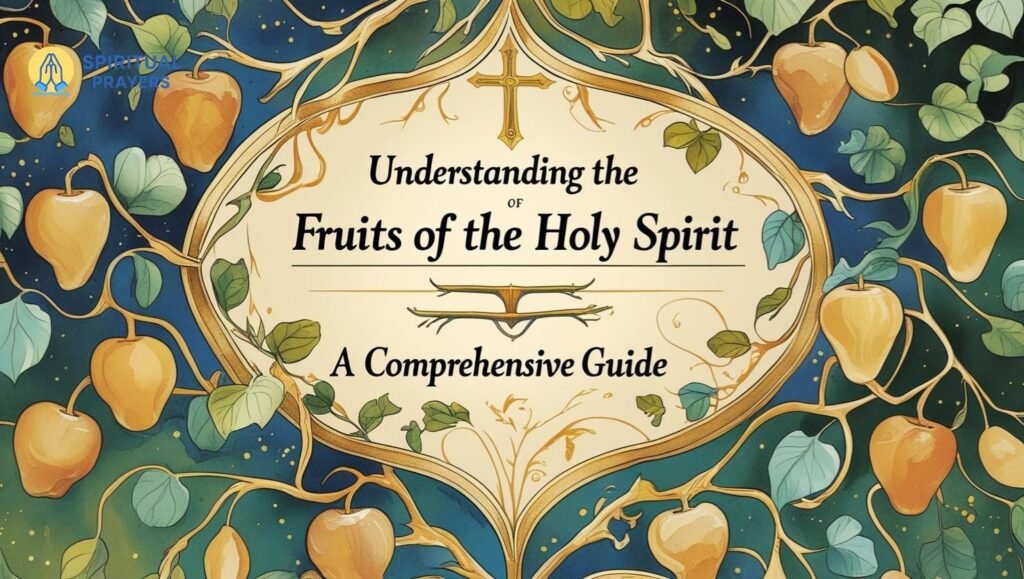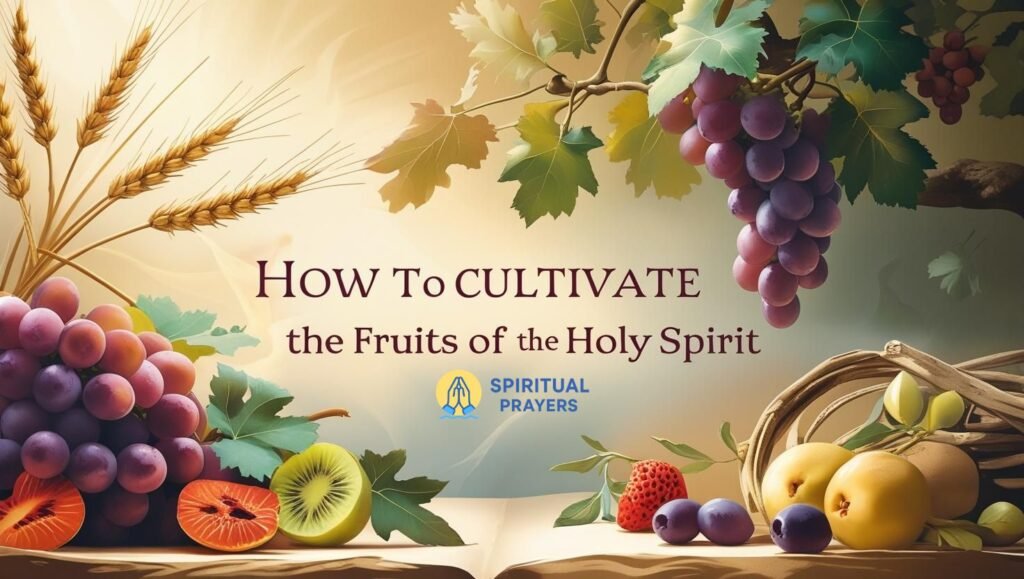
The Fruits of the Holy Spirit are profound virtues that reflect a life transformed by divine grace. Rooted in Christian theology, these qualities, as outlined in Galatians 5:22-23, embody the characteristics of a person living in alignment with the Holy Spirit. This article delves into the nine traditional Fruits of the Holy Spirit—love, joy, peace, patience, kindness, goodness, faithfulness, gentleness, and self-control—offering a detailed exploration of their meanings, biblical foundations, and practical applications in daily life.
What Are the Fruits of the Holy Spirit?

The Fruits of the Holy Spirit are spiritual attributes that manifest in the lives of those who are guided by the Holy Spirit. According to Galatians 5:22-23, these fruits contrast with the “works of the flesh,” which include negative behaviors like hatred and selfishness. The Apostle Paul describes the fruits as the natural outcome of a life surrendered to God’s guidance, producing virtues that benefit both the individual and their community.
Unlike the gifts of the Holy Spirit, which are specific abilities bestowed for particular purposes, the fruits are enduring qualities that shape one’s character. They are evidence of spiritual maturity and a deepening relationship with God. Each fruit contributes to a holistic, Christ-like life, fostering harmony within oneself and with others.
The Nine Fruits of the Holy Spirit Explained

1. Love (Charity)
Love, often referred to as charity (from the Greek agape), is the foundational fruit of the Holy Spirit. This selfless, unconditional love seeks the well-being of others without expecting anything in return. It mirrors God’s love for humanity, as demonstrated in John 3:16, where God gave His only Son for the salvation of the world.
In practice, love manifests through acts of kindness, forgiveness, and compassion. For example, volunteering at a local shelter or forgiving someone who has wronged you reflects this fruit. Love is the glue that binds all other fruits, enabling them to flourish in harmony.
2. Joy
Joy is a deep, abiding sense of happiness rooted in God’s presence, not fleeting circumstances. Unlike worldly happiness, which depends on external factors, spiritual joy persists even in trials, as seen in James 1:2-3, which encourages believers to find joy in challenges because they produce perseverance.
Cultivating joy involves gratitude and trust in God’s plan. Simple practices like keeping a gratitude journal or reflecting on God’s promises can nurture this fruit, allowing believers to radiate hope and positivity.
3. Peace
Peace is a state of inner tranquility and harmony with God, others, and oneself. Jesus, the Prince of Peace (Isaiah 9:6), offers this gift to His followers, as noted in John 16:33, where He promises peace amidst worldly troubles.
Practically, peace is fostered through prayer, meditation on Scripture, and reconciliation with others. For instance, resolving conflicts with a colleague or practicing mindfulness can cultivate this fruit, creating a ripple effect of calm in one’s environment.
4. Patience (Long-Suffering)
Patience, or long-suffering, is the ability to endure challenges, delays, or provocations without frustration. It reflects God’s patience with humanity, as seen in 2 Peter 3:9, where God delays judgment to allow repentance.
In daily life, patience might mean calmly waiting in traffic or persevering through a difficult project. Developing this fruit involves trusting God’s timing and practicing empathy, which strengthens relationships and personal resilience.
5. Kindness
Kindness is the quality of being friendly, generous, and considerate, often expressed through small, intentional acts. Ephesians 4:32 urges believers to be kind and compassionate, forgiving others as God forgave them.
Examples of kindness include helping a neighbor with groceries or offering a listening ear to a friend. This fruit builds community and reflects God’s mercy, encouraging others to respond in kind.
6. Goodness
Goodness is moral excellence and integrity, driven by a desire to do what is right. It aligns with Psalm 23:6, which speaks of God’s goodness and mercy following believers. Goodness goes beyond kindness, involving a commitment to justice and righteousness.
Practically, goodness might involve standing up against injustice or living with honesty in business dealings. It requires discernment and courage, shaping a life that honors God and inspires others.
7. Faithfulness
Faithfulness is steadfast loyalty and reliability, both to God and others. It reflects God’s unchanging nature, as described in Lamentations 3:22-23, where His mercies are new every morning.
In relationships, faithfulness shows up as keeping promises or being dependable in commitments. Spiritually, it involves consistent prayer and obedience to God’s Word, fostering trust and stability in one’s faith journey.
8. Gentleness (Meekness)
Gentleness, or meekness, is strength under control, characterized by humility and a calm demeanor. Jesus exemplified this in Matthew 11:29, describing Himself as “gentle and humble in heart.”
Gentleness is evident in how one speaks or handles conflict. For example, offering constructive feedback with care or comforting someone in distress demonstrates this fruit. It creates an atmosphere of safety and respect in interactions.
9. Self-Control (Temperance)
Self-control is the ability to govern one’s desires and actions, resisting temptation and aligning with God’s will. Proverbs 25:28 compares a lack of self-control to a city with broken walls, vulnerable to attack.
This fruit is crucial in areas like managing emotions, diet, or time. For instance, choosing to limit screen time or responding calmly in an argument reflects self-control. Prayer and accountability partnerships can strengthen this virtue.
How to Cultivate the Fruits of the Holy Spirit

Developing these fruits requires intentional spiritual practices and reliance on the Holy Spirit. Here are actionable steps to nurture them:
- Prayer and Meditation: Regular communication with God opens the heart to the Spirit’s guidance. Daily prayer, such as the Lord’s Prayer, aligns one’s will with God’s.
- Scripture Study: Reading and reflecting on Bible passages, like Galatians 5 or the Gospels, provides insight into living out these virtues.
- Community Involvement: Engaging in church or small groups fosters accountability and encouragement. Serving others, such as through charity work, amplifies these fruits.
- Self-Reflection: Journaling about personal growth areas, like impatience or lack of kindness, helps identify where the Spirit’s work is needed.
- Sacramental Life: For many Christians, participating in sacraments like the Eucharist strengthens their connection to the Holy Spirit.
The Role of the Fruits in Christian Life

The Fruits of the Holy Spirit are not just personal virtues; they have a communal impact. They enable believers to live as witnesses to Christ’s love, drawing others to faith. For example, a workplace marked by kindness and patience fosters a positive culture, reflecting God’s kingdom values.
Holy Bible, New International Version®, NIV® Copyright ©1973, 1978, 1984, 2011 by Biblica, Inc.® Used by permission. All rights reserved worldwide.
Moreover, these fruits counter societal challenges like division and selfishness. By embodying peace and goodness, Christians can bridge gaps in polarized communities, offering a glimpse of divine harmony.